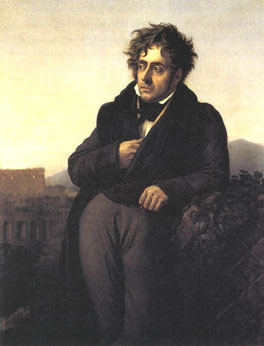Chateaubriand's manuscript
Detail from a portrait of Chateaubriand (1811) by Anne-Louis Girodet de Roucy-Triosson
By ADRIAN TAHOURDIN
If one had to think of the archetypal French Romantic writer then it would probably be Fran��ois-Ren�� de Chateaubriand (1768���1848). And I���m not just thinking of the studied pose (above). He was the author of short novels such as Atala (set in North America and notable for its sympathetic portrayal of Native Americans, and published in 1801) as well as that beautifully written study in self-absorbed melancholy, Ren�� (1802). Victor Hugo said of him ���I want to be Chateaubriand, or nothing���.
But Chateaubriand is perhaps best known now for his M��moires d���outre-tombe (available in a recent Penguin Classics abridged edition as Memoirs from Beyond the Tomb). In that book, regarded as a classic of French autobiography, and which he composed over a period of thirty years from 1811, Chateaubriand describes his lonely childhood in the Ch��teau of Combourg near Saint-Malo (to anyone who finds themselves near Saint-Malo and with time on their hands I can strongly recommend a visit to the rather forbidding property ��� vaut le d��tour), his military career, and journey to North America in 1791���2, where he was received by George Washington; his long (seven years) and rather miserable exile in England, where he taught French in Beccles in Suffolk for a time; a voyage to Jerusalem; the political career and his account of the Revolution; and vivid portraits of his close contemporary Napoleon, "whose genius he admired but whose despotism he detested���, in the words of the historian Philip Mansel, and of his entourage. As Mansel puts it, Chateaubriand was ���Royalist by birth, by conviction and by revulsion���, although he had initially welcomed the Revolution before turning against it. Talleyrand, meanwhile was characterized by Chateaubriand as ���vice leaning on the arm of crime���. Of Napoleon���s exile to the island of Elba, the author writes:
���Bonaparte had refused to embark in a French ship, setting store at that time only by the English Navy, because it was victorious; he had forgotten his former hatred, and the calumnies and insults which he had heaped upon perfidious Albion; he saw no one now who was worthy of his admiration save the triumphant party, and it was the Undaunted which took him to the place of his first exile.���
In a saga worthy of that other literary titan Balzac (who found the younger writer ���morose���), the Memoirs ��� or at least a manuscript copy of them ��� have become the subject of a legal wrangle. According to Pascale Robert-Diard and St��phane Durand-Souffland, writing in Le Monde and Le Figaro respectively (September 10), the fifty-eight-year-old lawyer Pascal Dufour was due to appear before a Paris court yesterday charged with attempting to sell the manuscript of Chateaubriand���s Memoirs at auction for between ���400,000 and ���500,000.
Thomas Samson/AFP
In 1836, finding himself in financial difficulties, the author sold the manuscript to his publishers Delloye et Sala with the proviso that it be published a year after his death ��� hence the title. The manuscript was written up by Chateaubriand���s secretary and placed in the hands of a Parisian lawyer, Ma��tre Cahouet, and into a safe with three keys ��� one in the possession of the lawyer, one with the publishers and one with the author. In 1847 the manuscript was replaced with an expanded version, which was published in 1850. The publishers were wound up shortly after and the manuscript has remained with the law firm ever since.
When Cahouet died he was succeeded by his clerk Jean Dufour. Pascal Dufour is his great-great-great-grandson (one Dufour went by the first name of Napol��on). Matters are complicated by the fact that the widower Chateaubriand died childless. State lawyers have therefore had to track down his closest known relative, one Guy de La Tour du Pin (scion of another aristocratic family), who has let it be known that he doesn���t want to press charges against Dufour, but would like the work to be returned to its rightful owner, i.e. the writer���s family.
The court will have to decide to whom the manuscript belongs; in other words, was Dufour within his rights to try to sell it, or is he guilty of an ���aggravated breach of trust���? It appears that the state has no stake in the matter: a spokesman for the National Archives has said that the manuscript constitutes a private archive rather than a national one. The verdict will be handed down ��� with characteristic speed ���- on December 10.
Peter Stothard's Blog
- Peter Stothard's profile
- 30 followers





